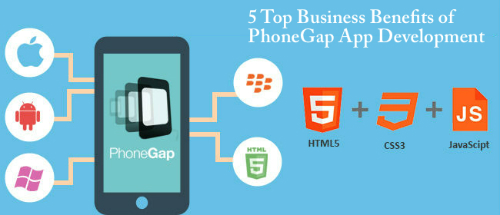A free and open source framework, PhoneGap is used to develop cross platform mobile applications based on HTML, JavaScript, CSS etc. technologies. This framework is widely being used to develop effective mobile applications that can run smoothly on iOS, Android, and Windows operating systems. Here are the topmost benefits of PhoneGap framework-


1. Business reach to worldwide visitors with single development process: With PhoneGap framework, you can get mobile apps that can be logically implemented over various mobile OS such as Android, iOS, and Windows. With this, you can engage the worldwide users with your business applications and gain great exposure. With a single development cost in a very less time effort, you can target the broader audiences.
2. Easy interaction with customers: With PhoneGap based applications, the business owners can track the user behaviour by collecting various data. This provides an ability to make smart decisions as per the user behaviour and interests pattern and serve the desired needs in the customized ways. It establishes a good interaction bond between customers and businesses.
3. Higher return on investment: PhoneGap framework offers high-end performance applications. As per the business nature, needs and the ongoing trend, you can get the required features in a more flexible way. With such flexible and easy feature implementation process, you can get higher returns on investment and increase the profitability to a great extent.
4. Effective advertisement: With PhoneGap based applications, you can run ads on different mobile devices simultaneously. This makes the users know your services or businesses and also creates the robust brand image. Ads pertaining to various services can be easily created and you would be able to attract a wide range of audiences globally.
5. Easy app management in low time: With PhoneGap, business owners can easily distribute and publish their applications over various application stores. It helps in product marketing. The robust and clean architecture helps the app owners to manage the application. The feature upgradation and customization process also become easier with PhoneGap.
PhoneGap based applications are in high demand. For higher ROI and business brand enhancement, the mobile application developed on this framework are better serving the business needs. A reputed PhoneGap app development company, Apps24x7 can bring the best application to take your business to the next level.
2. Easy interaction with customers: With PhoneGap based applications, the business owners can track the user behaviour by collecting various data. This provides an ability to make smart decisions as per the user behaviour and interests pattern and serve the desired needs in the customized ways. It establishes a good interaction bond between customers and businesses.
3. Higher return on investment: PhoneGap framework offers high-end performance applications. As per the business nature, needs and the ongoing trend, you can get the required features in a more flexible way. With such flexible and easy feature implementation process, you can get higher returns on investment and increase the profitability to a great extent.
4. Effective advertisement: With PhoneGap based applications, you can run ads on different mobile devices simultaneously. This makes the users know your services or businesses and also creates the robust brand image. Ads pertaining to various services can be easily created and you would be able to attract a wide range of audiences globally.
5. Easy app management in low time: With PhoneGap, business owners can easily distribute and publish their applications over various application stores. It helps in product marketing. The robust and clean architecture helps the app owners to manage the application. The feature upgradation and customization process also become easier with PhoneGap.
PhoneGap based applications are in high demand. For higher ROI and business brand enhancement, the mobile application developed on this framework are better serving the business needs. A reputed PhoneGap app development company, Apps24x7 can bring the best application to take your business to the next level.




